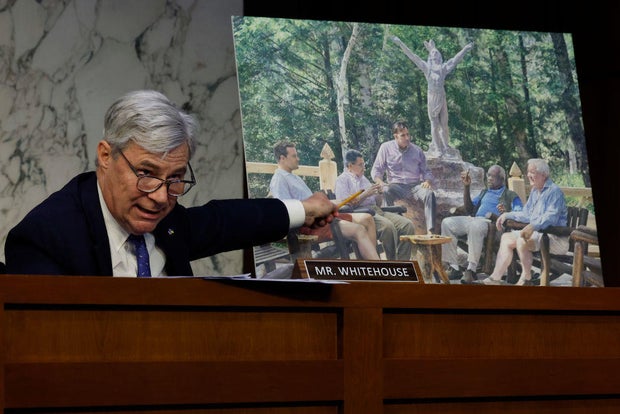Washington — The Senate Judiciary Committee plans to vote to issue subpoenas to two wealthy Republican donors and an influential conservative legal activist after their involvement in luxury trips provided to two Supreme Court justices was revealed this summer, marking a significant escalation into Democrats’ investigation into the ethics practices at the high court.
The committee could vote as soon as Nov. 9 to authorize the subpoenas for donors Harlan Crow and Robin Arkley II, as well as Leonard Leo, who played an instrumental role in the confirmations of several of the current Supreme Court justices. Judiciary Committee Chairman Dick Durbin and Sen. Sheldon Whitehouse announced Monday that the panel would vote to issue the subpoenas.
The 11 Democratic members of the Judiciary panel could authorize the subpoenas without Republican support. GOP members of the committee have accused Democrats of targeting the conservative justices following a series of decisions on abortion, affirmative action, guns and religious rights.
Judiciary Committee Democrats have been seeking information from Crow, Arkley and Leo since the summer after a series of reports from the investigative news outlet ProPublica revealed ties between Justices Clarence Thomas and Samuel Alito with the Republican donors.
Chip Somodevilla/Getty Images
According to ProPublica, Thomas accepted lavish trips on Crow’s private plane and yacht, and vacationed at his resort in the Adirondacks over the course of their 25-year friendship, and did not report the gifts on his financial disclosure forms. His latest disclosure form, filed in August, did include details about a 2014 real estate transaction with Crow for three Georgia properties he purchased from Thomas and his family.
ProPublica also reported that Arkley, the owner of a mortgage company, provided lodging to Alito during a luxury fishing trip to Alaska in 2008. Alito, who did not disclose the lodging he received or trip aboard a private jet for the outing, refuted the notion that it should have been reported, citing exceptions for personal hospitality.
Still, Durbin and White House said it is “imperative that we understand the full extent of how people with interests before the Court are able to use undisclosed gifts to gain private access to the justices.”
“By accepting these lavish, undisclosed gifts, the justices have enabled their wealthy benefactors and other individuals with business before the court to gain access to the justices while preventing public scrutiny of this conduct,” the Democratic senators said in a joint statement announcing the vote on subpoenas.
Arkley and Leo have declined the committee’s requests for information, and a lawyer for Leo told the panel in a letter dated Oct. 19 that it is acting without a valid legislative purpose and engaging in political retaliation. Durbin, of Illinois, and Whitehouse, of Rhode Island, said Crow offered to provide the Judiciary committee with limited responses to some of its requests, which the Democratic senators said is “wholly inadequate.”
Leo said in response to the committee’s plan to vote on subpoenas that he “not bow to the vile and disgusting liberal McCarthyism that seeks to destroy the Supreme Court simply because it follows the Constitution rather than their political agenda.”
The revelations about Thomas’ relationship with Crow and Alito’s trip to Alaska has led to increased pressure on the Supreme Court to adopt a binding code of ethics, which it currently does not have. The Judiciary Committee advanced legislation in July that would require the Supreme Court to adopt an ethics code, though it is unlikely to win approval by the full Senate and even be considered by the GOP-led House.
At least three of the justices, Elena Kagan, Brett Kavanaugh and Amy Coney Barrett, have publicly suggested that they favor adoption of a formal set of ethics principles or indicated the court is considering doing so.
Chief Justice John Roberts also said in May that there is more the high court can do to “adhere to the highest standards” of ethical conduct and that the justices “are continuing to look at the things we can do to give practical effect to that commitment.”
The committee’s plan to authorize subpoenas as part of its investigation into ethics issues at the Supreme Court is likely to increase pressure on Roberts to impose ethics policies at the court.
“The Chief Justice could fix this problem today and adopt a binding code of conduct,” Durbin and Whitehouse said. “As long as he refuses to act, the Judiciary Committee will.”
